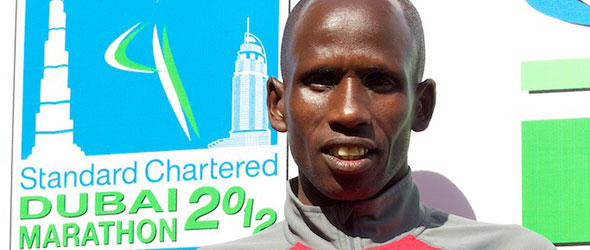The Standard Chartered Dubai Marathon, which celebrates its 13th edition on Friday morning, has been a happy hunting ground for Ethiopian runners in the past, foremost among them former world record holder Haile Gebrselassie, who won here three times.
But when Geb dropped out of last Autumn’s Berlin Marathon, devastated by Patrick Makau’s mid-race surge, which helped the young Kenyan to break the Ethiopian’s world record, Haile mused that he and his compatriots were being obliterated by their East African neighbours.
Evidence of that are some extraordinary statistics: close to 500 Kenyan men under 2hr 20min for the marathon last year, with 162 of them under the Olympic qualifying time of 2.12. All of the major events in 2011 were won by Kenyans, including the world titles, and 37 of them ran 41 of the world’s top fifty times. Just to rub it in, the first non-Kenyan in last year’s rankings, in 21st place, is not even Ethiopian. He is Marilson dos Santos of Brazil.
That trend is likely to continue in Dubai on Friday, the more so since the resurgent Martin Lel has chosen the Gulf race to try and force his way into consideration for one of those three coveted Olympic spots. Lel has all the credentials, but maybe at 33, a little too much seniority to repulse what he calls, “the young energetic ones”.
Following five victories shared between London and New York, from 2003 to 2007, Lel was named world’s top marathoner three times. A bad injury looked to have ruined if not ended his career, but an 11th hour comeback in London last April, when he was barely ready, resulted in an extraordinary performance, second in 2.05.45, just 30 seconds slower than when he won three years earlier.
That puts him at the head of the favourites, but such is the lure of Dubai nowadays, with its $250,000 first prize, that Lel has no fewer than 17 other sub-2.08 marathoners lining up alongside of him.
“I hope it will be a great day for me on Friday,” he said at today, Wednesday’s press conference, “it’s great to have such a strong race to help me try for Olympic selection. I’ve seen how Haile has performed well here, and if the group is strong, I hope to produce a good race”.
A decade younger, last year’s surprise winner, colleague David Barmasai also entertains ideas of an Olympic place, although with men who have done 2.04 and better at the head of the queue, that might be presumptuous. But, says Barmasai, “If the race could give me a good result I might have a chance of an Olympic place, but as defending champion, the pressure is on me this year”.
The leading Ethiopian challengers are Tadesse Tola (2.06.33), Chala Dechase, who was second to Haile two years ago in 2.06.33, Markos Geneti, who won Los Angeles last year, in 2.06.35, and Deriba Merga (2.06.38), who was 4th in the Olympic Games in Beijing.
The evergreen Hendrick Ramaala of South Africa will be 40 years old next week; and hopes to celebrate that by qualifying for his fifth Olympic Games, with a performance close to 2.10. “This is very important for me. I’ve done some great sessions at home, and am looking to make the (Olympic) team. For me, 40 is the new 21. I’ve watched Dubai on TV, and seen Haile and the Kenyans go for world records here. If the wind drops I think we’ll get some wonderful times”.
In contrast, a Kenyan woman has never won Dubai. Lydia Cheromei of Kenya, who first astonished by winning the world junior cross, aged 13, in 1991, looked as if she was going to do the trick last year, but was outpaced in the final kilometres by Ethiopian Assefelech Mergia. Both return this year, as does Mamitu Daska of Ethiopia, who won in 2010.
But though she has never raced the marathon distance, Lucy (Wangui) Kabuu has enough confidence for the whole women’s field. The Kenyan, who twice ran just shy of 67mins for the ‘half’ last year, clearly has possibilities at the full distance. She is in no doubt, saying, “I’ve trained well for this, I think I can do 2.18 or 2.19, and maybe even break the Kenyan record (2.18.47, Catherine Ndereba).
The Standard Chartered Dubai Marathon is one of those events which launched with just over 100 runners in 2000, on what was then thought the periphery of the marathon world. Nowadays, with one million dollars in prize money, and the highest first place award ($250k) for both men and women, with over 2000 runners competing the full distance, and over 10,000 in the five and 10k events, it’s suddenly got much closer to the centre of the distance running universe.









